
by Gale | Apr 16, 2013 | About Mormons
Many people think of sacrifice as an old-fashioned thing. In the Bible it seems to be something confined to the Old Testament, done away with in Christ’s “new law.” When the ancient Israelites failed to qualify to “enter into God’s rest,” He gave them a “schoolmaster law,” which was a law of outward ordinances. Rituals, and practices, and patterns of religious behavior were all symbolic of the Christ, a preparation for the higher law to come. When Jesus was offered up, He became the great and last sacrifice by the shedding of blood, and asked us to come unto Him with a broken heart and a contrite spirit, and to place our sins upon the altar. As we progress, we are also able to place our will upon the altar, and to surrender our lives to His service.
What then of sacrifice? Sacrifice means giving up something for a higher good. When one considers the two levels of priesthood, the Aaronic or lower priesthood, and the Melchizedek, or higher priesthood, sacrifice couples with repentance as Aaronic principles. They are foundational—the floor of the eternal, precious edifice that is the gospel of Jesus Christ. Upon them, we build on a sure foundation, adding the Gift of the Holy Ghost, our desires to reconcile with God, and our surrender to His will.
In Mormonism, which is the Church of Jesus Christ restored in it’s fullness in these last days before His Second Coming, Latter-day Saints exercise the principle of sacrifice in many ways.
Tithing
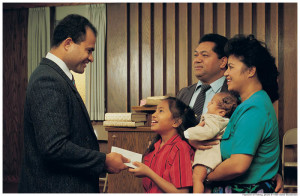 Tithing is by definition one tenth of one’s increase, and has always been a law of the gospel. A person who pays tithing in the proper spirit realizes that all he or she has comes from God, and that all He requests is one tenth in return as an offering. By living this law, followers of the Savior reap the blessings He has promised to the obedient. In fact, He blesses us so much, that we are again in His debt. The paying of tithing is ennobling. Tithe payers increase in humility, sensitivity to the Spirit, faith, and patience, even as they are blessed line upon line with the doctrines of the kingdom, and even with worldly sustenance. This is not a prosperity gospel, but a sustenance promise. Those full-tithe-payers who have faced financial emergencies have been rescued time after time by miraculous means. (more…)
Tithing is by definition one tenth of one’s increase, and has always been a law of the gospel. A person who pays tithing in the proper spirit realizes that all he or she has comes from God, and that all He requests is one tenth in return as an offering. By living this law, followers of the Savior reap the blessings He has promised to the obedient. In fact, He blesses us so much, that we are again in His debt. The paying of tithing is ennobling. Tithe payers increase in humility, sensitivity to the Spirit, faith, and patience, even as they are blessed line upon line with the doctrines of the kingdom, and even with worldly sustenance. This is not a prosperity gospel, but a sustenance promise. Those full-tithe-payers who have faced financial emergencies have been rescued time after time by miraculous means. (more…)
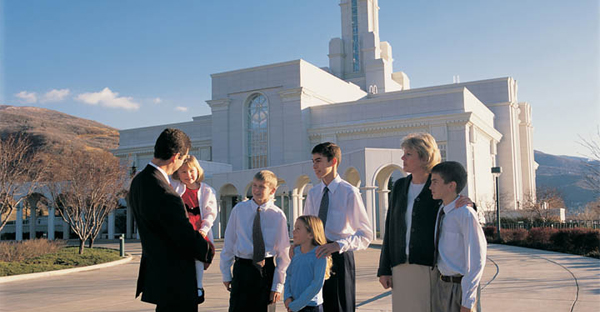
by Gale | Feb 20, 2013 | About Mormons
A Gallup Poll has found that for the second straight year, Utah is the second most religious state in America, following #1, Mississippi. Eight out of ten of the most religious states in the Union are in the South, while the most irreligious states are in the northeast. Oklahoma is tenth on the list and is considered part of the American mid-West.
The poll determined religiosity by asking how often people attend religious services and whether they consider religion very important. Fifty-eight percent of people in Mississippi attend church nearly every week and consider themselves very religious. The study was based on interviews with nearly 350,000 people. [1]
This 2012 Gallup study showed little change from 2011 — within one percentage point.
There are a number of explanations for the substantial differences in religiousness across the states of the union, but analysis included in the recent book God Is Alive and Well shows that the differences are not accounted for by state demographics such as race and ethnicity, or — with the exception of Utah — by the type of religion that predominates in each state. More likely the differences reflect regional cultural traditions. [2]
 Some of the comments on the Deseret News article reporting on the study asked if Utah really wanted to be equated with the states in the deep south of America, where education and economic levels are lower than elsewhere in the country. Other polls and studies have shown, however, that Mormonism (The Church of Jesus Christ of Latter-day Saints) is unlike virtually all other religions in the world, in that the most religious are also the most educated. Utah is also at the top of the list for volunteerism and general giving. It is also the one religious state with a very low rate of teen pregnancy and other ills associated with low-income populations. Gallup’s “State of the States” Series investigates well-being in each of the fifty states. (more…)
Some of the comments on the Deseret News article reporting on the study asked if Utah really wanted to be equated with the states in the deep south of America, where education and economic levels are lower than elsewhere in the country. Other polls and studies have shown, however, that Mormonism (The Church of Jesus Christ of Latter-day Saints) is unlike virtually all other religions in the world, in that the most religious are also the most educated. Utah is also at the top of the list for volunteerism and general giving. It is also the one religious state with a very low rate of teen pregnancy and other ills associated with low-income populations. Gallup’s “State of the States” Series investigates well-being in each of the fifty states. (more…)

by Gale | Feb 4, 2013 | About Mormons
Mormons (members of The Church of Jesus Christ of Latter-day Saints) hope to be worthy to marry the “right person, at the right time, in the right place” (late Mormon prophet Spencer W. Kimball). That means marrying a person of whom the Lord approves, when both bride and groom are well-prepared, in a Mormon temple where eternal covenants can be made. Couples throughout history in various places of the world have married for various reasons. Sometimes marriages were arranged, and partners had little hope of being soul-mates; some marriages were essentially business arrangements, and husbands expected to dally with other women to find emotional happiness. Nowadays in America, a single person searches for a soul-mate with whom he or she may be compatible in all aspects of married life. American couples tend to divorce when that simpatico element wears off or a partner disappoints in some way. Cohabitation and “starter marriages” are meant to qualify partners to make sure they are perfect.
“You come to love not by finding the perfect person, but by learning to see an imperfect person perfectly.” – Sam Keen
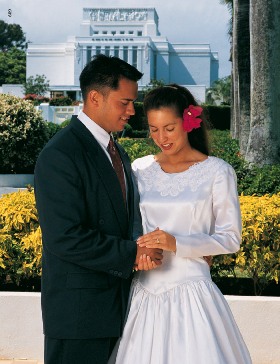 The Mormon view of marriage is quite different. God is interested not only in our salvation, but in our exaltation, which means joining Him in the very highest kingdom of heaven where He dwells, a place of utmost glory and goodness. The highest of the highest kingdom of heaven is reserved for those who have entered into the eternal marriage covenant and kept those covenants, enduring to the end with faith in Christ. These expect to dwell with their families forever. Mormons who are considering marriage are privy to personal revelation to validate their choice. This important decision, especially, concerns Heavenly Father, and He is ever ready to help. (more…)
The Mormon view of marriage is quite different. God is interested not only in our salvation, but in our exaltation, which means joining Him in the very highest kingdom of heaven where He dwells, a place of utmost glory and goodness. The highest of the highest kingdom of heaven is reserved for those who have entered into the eternal marriage covenant and kept those covenants, enduring to the end with faith in Christ. These expect to dwell with their families forever. Mormons who are considering marriage are privy to personal revelation to validate their choice. This important decision, especially, concerns Heavenly Father, and He is ever ready to help. (more…)
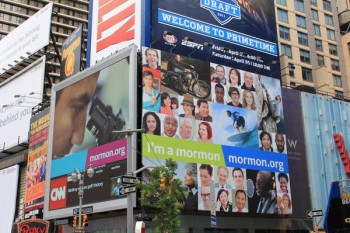
by Gale | Dec 18, 2012 | About Mormons
During the years of the U.S. presidential campaign and especially during 2012 Mormons and Mormonism were constantly in the news, for better or for worse. Certainly, Mitt Romney was (and is) a stellar example of what Mormonism (The Church of Jesus Christ of Latter-day Saints) can produce — he is a devoted and faithful husband and father, who gives generously to charity, and who has spent countless hours (in spite of a demanding and successful career) in direct service to his church. In his church service he has been the equivalent of a pastor or priest, but all this was done without remuneration. Romney came in only a few hundred thousand votes behind Barak Obama and fared especially well with white Christian voters. These seemed to read some articles about Mormons and Mormonism, and their opinions tended to take a turn toward viewing Mormonism with a favorable eye. “Roughly 4-in-10 (42 percent) now see the Mormon religion and their own beliefs as having a lot in common, up 14 points from 28 percent in November 2011.” But the rest of the American population seems not to have paid much attention. A new, post-election study performed by the Pew Forum, albeit very small (only about 1,500 respondents), shows most people know no more about Mormonism now than they did before the campaign. (Read more here….)
“More Americans mention positive terms such as ‘good people,’ ‘dedicated’ and ‘honest’ than did so one year ago (24 percent today vs. 18 percent in 2011),” the report indicated. “Impressions of Mormonism using positive descriptors is up among several religious groups, including white evangelical Protestants, white mainline Protestants and white Catholics — all groups that favored Romney in the election.”
 The study showed that about the same amount of people as in 2011 think Mormonism is not a Christian religion. “Romney was the subject of about twice as much religion-related media coverage as Barack Obama in the 2012 presidential campaign, according to a separate analysis by the Pew Research Center’s Project for Excellence in Journalism and the Pew Forum.” [1] (more…)
The study showed that about the same amount of people as in 2011 think Mormonism is not a Christian religion. “Romney was the subject of about twice as much religion-related media coverage as Barack Obama in the 2012 presidential campaign, according to a separate analysis by the Pew Research Center’s Project for Excellence in Journalism and the Pew Forum.” [1] (more…)
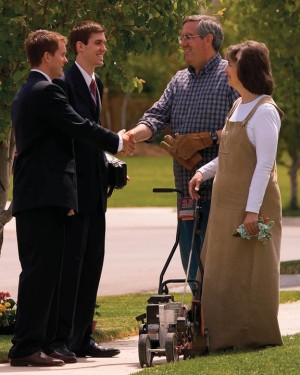
by Gale | May 18, 2012 | About Mormons
Members of The Church of Jesus Christ of Latter-day Saints (sometimes called the “Mormon Church” by friends of other faiths) are often referred to as “Mormons.” I am a Mormon. And I am a regular, every day young adult.
What is an average day like in the life of a Mormon?
 The average day for a Mormon is just like their respected peers. In America, where I live, the average day consists of going to work, spending time with family, finding someway to serve a friend or loved one, doing regular household chores, etc. For instance, today I have: read my scriptures, exercised, eaten food, done some laundry, eaten more food (including some really yummy frozen grapes!). Later I will be going shopping, and then tonight I will spend time with my wonderful family! A pretty ordinary day, but wonderful nonetheless. (more…)
The average day for a Mormon is just like their respected peers. In America, where I live, the average day consists of going to work, spending time with family, finding someway to serve a friend or loved one, doing regular household chores, etc. For instance, today I have: read my scriptures, exercised, eaten food, done some laundry, eaten more food (including some really yummy frozen grapes!). Later I will be going shopping, and then tonight I will spend time with my wonderful family! A pretty ordinary day, but wonderful nonetheless. (more…)

 Tithing is by definition one tenth of one’s increase, and has always been a law of the gospel. A person who pays tithing in the proper spirit realizes that all he or she has comes from God, and that all He requests is one tenth in return as an offering. By living this law, followers of the Savior reap the blessings He has promised to the obedient. In fact, He blesses us so much, that we are again in His debt. The paying of tithing is ennobling. Tithe payers increase in humility, sensitivity to the Spirit, faith, and patience, even as they are blessed line upon line with the doctrines of the kingdom, and even with worldly sustenance. This is not a prosperity gospel, but a sustenance promise. Those full-tithe-payers who have faced financial emergencies have been rescued time after time by miraculous means. (more…)
Tithing is by definition one tenth of one’s increase, and has always been a law of the gospel. A person who pays tithing in the proper spirit realizes that all he or she has comes from God, and that all He requests is one tenth in return as an offering. By living this law, followers of the Savior reap the blessings He has promised to the obedient. In fact, He blesses us so much, that we are again in His debt. The paying of tithing is ennobling. Tithe payers increase in humility, sensitivity to the Spirit, faith, and patience, even as they are blessed line upon line with the doctrines of the kingdom, and even with worldly sustenance. This is not a prosperity gospel, but a sustenance promise. Those full-tithe-payers who have faced financial emergencies have been rescued time after time by miraculous means. (more…)





 The average day for a Mormon is just like their respected peers. In America, where I live, the average day consists of going to work, spending time with family, finding someway to serve a friend or loved one, doing regular household chores, etc. For instance, today I have: read my scriptures, exercised, eaten food, done some laundry, eaten more food (including some really yummy frozen grapes!). Later I will be going shopping, and then tonight I will spend time with my wonderful family! A pretty ordinary day, but wonderful nonetheless.
The average day for a Mormon is just like their respected peers. In America, where I live, the average day consists of going to work, spending time with family, finding someway to serve a friend or loved one, doing regular household chores, etc. For instance, today I have: read my scriptures, exercised, eaten food, done some laundry, eaten more food (including some really yummy frozen grapes!). Later I will be going shopping, and then tonight I will spend time with my wonderful family! A pretty ordinary day, but wonderful nonetheless.